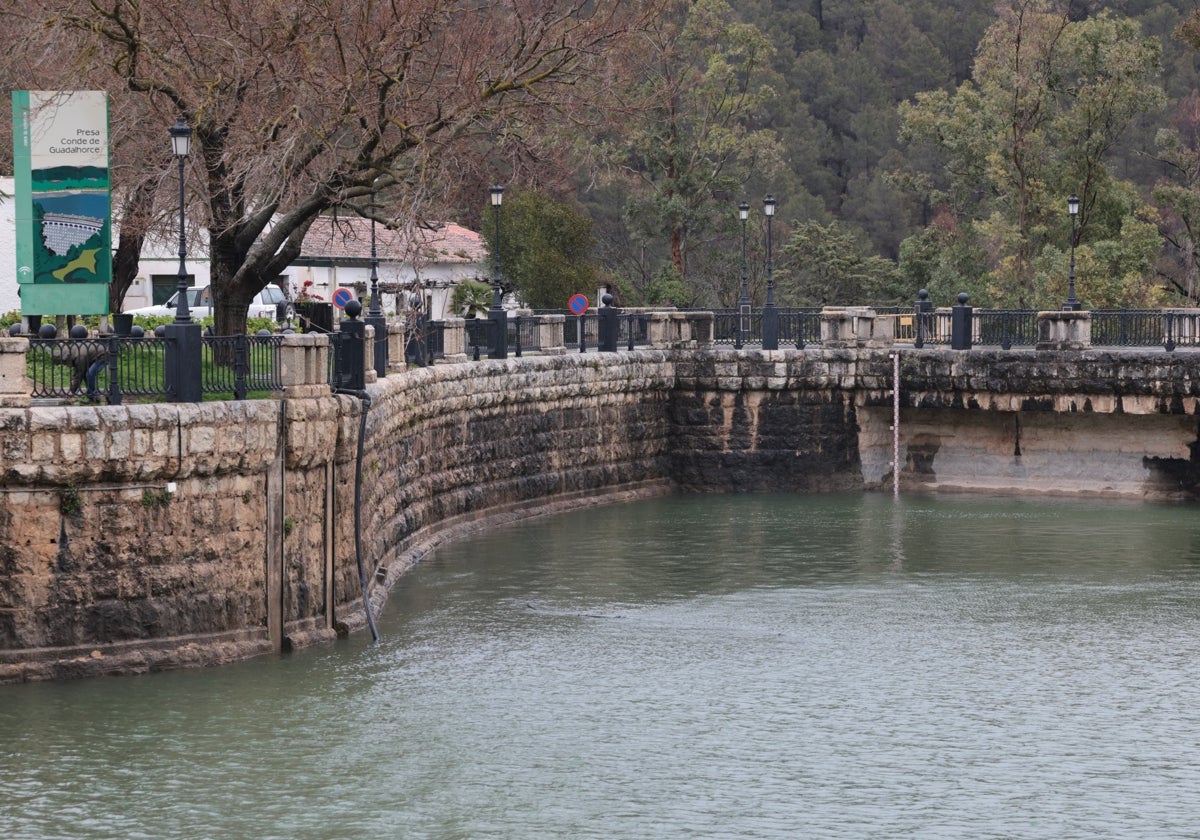Rainfall and storms change reservoir order in Malaga province
The rise in La Viñuela and Conde de Guadalhorce has been miraculous and at La Concepción water has had to be released for several days running
The ranking of the reservoirs with the highest water contents in Malaga province has been turned upside down. Their current state has been heavily influenced by the first 'Dana' storm last November, followed by the one that started on 28 February and the storms Jana and Konrad, which are still bringing significant rainfall to the province.
The curb of La Concepción and the rise of Conde
Since April 2024 and until last week, the La Concepción reservoir, located between Marbella and Istán, was making history, storing the highest amount of water despite being the smallest one in the province. However, it has been releasing 60 cubic metres per second since Friday 7 March, when it reached 48 million cubic metres. At the moment, it is fourth in the ranking.
Another 'small' reservoir, the Conde de Guadalhorce, supplied by the Turón river, is currently leading the ranking. Recent downpours have caused the rise in the river's levels and, therefore, in the dam, even though the Conde is also releasing water to keep its curve flattened. The goal is to ensure the structure's safety by manually controlling the inflows and preventing overfilling. The Conde de Guadalhorce currently stores more than 61 million cubic metres, which is 93% of its capacity. Its historical minimum was in November 2023.
Respite in La Viñuela
The second reservoir with the most water is La Viñuela. Following this Thursday's rain, it was estimated that levels exceeded 53 million cubic metres. With this, La Viñuela is out of the drought state, although procedures need to be carried out in accordance with the special drought plan to verify with certainty. It is important to compare the reservoir's current state to the 12 million cubic metres it had in January 2024.
Guadalteba
The Guadalteba, the second in size after La Viñuela, comes next, with 48.91 million cubic metres recorded in the late afternoon on Thursday. Teba river was contributing with 8 cubic metres per second, which is five times the consumption of Malaga city in that short period of time.
La Concepción
With 48 million cubic metres, the reservoir that takes the fourth place is the La Concepción. However, its water cannot be transferred or used for drinking (due to the incapacity and obsolescence of the Verde drinking water treatment station, ETAP, which has a major project in the tendering phase worth 35 million euros) nor used raw, due to the deficiencies of the entire upstream network.
Guadalhorce
The Guadalhorce reservoir, salinised by discharges from the Meliones spring, hit rock bottom just a few months ago, in October 2024. It has somewhat recovered and now accumulates 30 million cubic metres.
Limonero and Casasola
The two remaining reservoirs are not, strictly speaking, regulation reservoirs, but flood abatement reservoirs, designed to contain the inflows of the Guadalmedina and Campanillas rivers, respectively. However, both are being used as strategic reservoirs to preserve the main sources and tackle the problems with turbidity, mud and dragging of inflows from the Guadalhorce system, as well as from the Aljaima and Fahala wells.
Casasola, in Almogía, has more than 20.5 million cubic metres, which is very close to its full capacity. This means that it is only a matter of hours before it is released, albeit on a small scale, depending on the flow of the Campanillas downstream.
Limonero is the reservoir with the least amount of water - almost 11 million cubic metres, which is still unusual compared to previous years.

